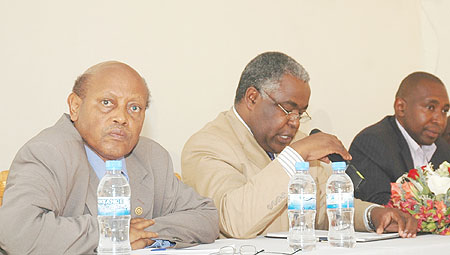Educators have been urged to take it upon themselves to courageously teach their students about the Genocide if they are to be agents of change.


Educators have been urged to take it upon themselves to courageously teach their students about the Genocide if they are to be agents of change.
The advice was given by the Rector of Kigali Institute of Education (KIE) Prof. George Njoroge, during a workshop on teaching Genocide and community cohesion.
The programme is jointly run by KIE and the Nottingham University of the United Kingdom.
"In education, we are expected to have the power to steer transformation of the society as agents of change and we have to face this problem with courage,” he said.
Njoroge added that every educator has the ability to integrate Genocide studies in every subject given that all subjects have a dimensional connection with genocide.
Speaking to The New Times, the organiser of the workshop and the head of Social Sciences at KIE, Jean Leonard Buhigiro, said that the focus of the workshop was to show how Genocide studies can be integrated in other subjects apart from history.
He gave an example how computer science can integrate the genocide aspect in its teaching through electronic sources.
He explained that the programme, which has been running in KIE for the last two years, was a result of a parliamentary report on the rampant Renocide ideology in schools.
"KIE, as a teachers, training institute, started looking for ways we could participate in eliminating this problem in schools. So we partnered with the University of Nottingham which has a long history in Holocaust teachings and came up with the Education for Community Cohesion Project,” said Buhigiro.
According to him, the aim of the project is to develop teachers who can employ a range of pedagogies to promote community cohesion in both formal and non-formal educational settings.
It is also expected to enhance peace and citizenship education in both partner countries and, in particular, explore issues concerning Genocide studies.
Presenting a research paper by KIE students, Jean Pierre Nizeyimana noted that Genocide teaching should be based on causes, consequences and prevention of genocide. He further said that teaching of Genocide, if done in a proper manner, can promote community cohesion.
Genocide studies are offered at UNATEK University, KIE and the National University of Rwanda which has a Master’s programme.
Ends


